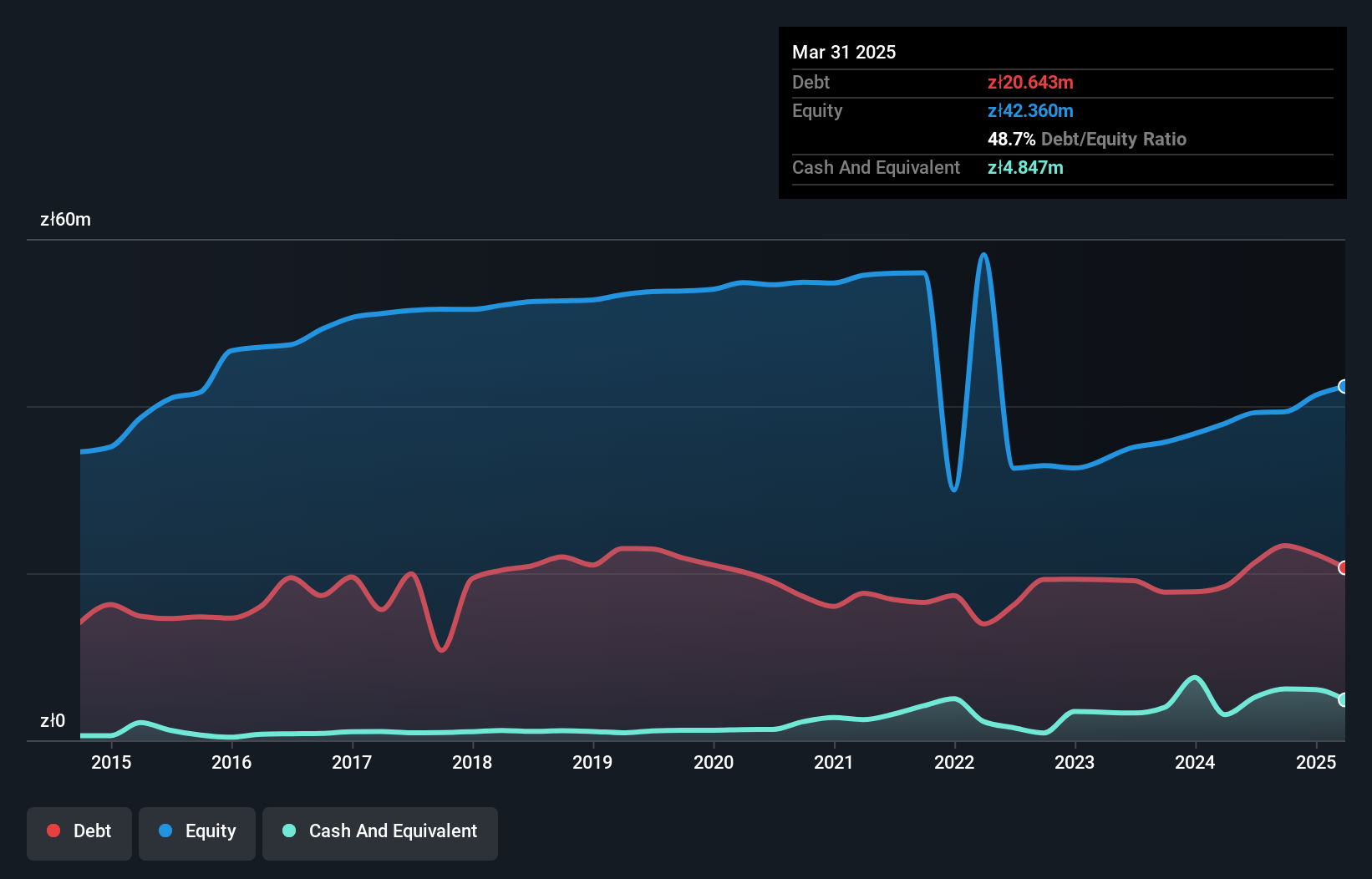
David Iben put it well when he said, 'Volatility is not a risk we care about. What we care about is avoiding the permanent loss of capital.' When we think about how risky a company is, we always like to look at its use of debt, since debt overload can lead to ruin. As with many other companies Biogened S.A. (WSE:BGD) makes use of debt. But the more important question is: how much risk is that debt creating?
When Is Debt A Problem?
Debt and other liabilities become risky for a business when it cannot easily fulfill those obligations, either with free cash flow or by raising capital at an attractive price. Ultimately, if the company can't fulfill its legal obligations to repay debt, shareholders could walk away with nothing. However, a more frequent (but still costly) occurrence is where a company must issue shares at bargain-basement prices, permanently diluting shareholders, just to shore up its balance sheet. Of course, the upside of debt is that it often represents cheap capital, especially when it replaces dilution in a company with the ability to reinvest at high rates of return. The first step when considering a company's debt levels is to consider its cash and debt together.
What Is Biogened's Debt?
As you can see below, at the end of March 2025, Biogened had zł20.6m of debt, up from zł18.4m a year ago. Click the image for more detail. However, because it has a cash reserve of zł4.85m, its net debt is less, at about zł15.8m.

A Look At Biogened's Liabilities
According to the last reported balance sheet, Biogened had liabilities of zł27.7m due within 12 months, and liabilities of zł21.2m due beyond 12 months. Offsetting these obligations, it had cash of zł4.85m as well as receivables valued at zł27.8m due within 12 months. So it has liabilities totalling zł16.3m more than its cash and near-term receivables, combined.
This deficit isn't so bad because Biogened is worth zł74.7m, and thus could probably raise enough capital to shore up its balance sheet, if the need arose. But it's clear that we should definitely closely examine whether it can manage its debt without dilution.
Check out our latest analysis for Biogened
We use two main ratios to inform us about debt levels relative to earnings. The first is net debt divided by earnings before interest, tax, depreciation, and amortization (EBITDA), while the second is how many times its earnings before interest and tax (EBIT) covers its interest expense (or its interest cover, for short). Thus we consider debt relative to earnings both with and without depreciation and amortization expenses.
Looking at its net debt to EBITDA of 1.1 and interest cover of 3.9 times, it seems to us that Biogened is probably using debt in a pretty reasonable way. But the interest payments are certainly sufficient to have us thinking about how affordable its debt is. One way Biogened could vanquish its debt would be if it stops borrowing more but continues to grow EBIT at around 10%, as it did over the last year. The balance sheet is clearly the area to focus on when you are analysing debt. But it is Biogened's earnings that will influence how the balance sheet holds up in the future. So if you're keen to discover more about its earnings, it might be worth checking out this graph of its long term earnings trend.
But our final consideration is also important, because a company cannot pay debt with paper profits; it needs cold hard cash. So the logical step is to look at the proportion of that EBIT that is matched by actual free cash flow. Over the last three years, Biogened reported free cash flow worth 14% of its EBIT, which is really quite low. For us, cash conversion that low sparks a little paranoia about is ability to extinguish debt.
Our View
We weren't impressed with Biogened's interest cover, and its conversion of EBIT to free cash flow made us cautious. Balancing that a bit, it has a demonstrated ability net debt to EBITDA. Looking at all this data makes us feel a little cautious about Biogened's debt levels. While we appreciate debt can enhance returns on equity, we'd suggest that shareholders keep close watch on its debt levels, lest they increase. There's no doubt that we learn most about debt from the balance sheet. However, not all investment risk resides within the balance sheet - far from it. For instance, we've identified 2 warning signs for Biogened (1 is a bit concerning) you should be aware of.
When all is said and done, sometimes its easier to focus on companies that don't even need debt. Readers can access a list of growth stocks with zero net debt 100% free, right now.
Valuation is complex, but we're here to simplify it.
Discover if Biogened might be undervalued or overvalued with our detailed analysis, featuring fair value estimates, potential risks, dividends, insider trades, and its financial condition.
Access Free AnalysisHave feedback on this article? Concerned about the content? Get in touch with us directly. Alternatively, email editorial-team (at) simplywallst.com.
This article by Simply Wall St is general in nature. We provide commentary based on historical data and analyst forecasts only using an unbiased methodology and our articles are not intended to be financial advice. It does not constitute a recommendation to buy or sell any stock, and does not take account of your objectives, or your financial situation. We aim to bring you long-term focused analysis driven by fundamental data. Note that our analysis may not factor in the latest price-sensitive company announcements or qualitative material. Simply Wall St has no position in any stocks mentioned.
About WSE:BGD
Biogened
Develops, produces, and distributes pharmaceutical products in Poland.
Excellent balance sheet and slightly overvalued.
Market Insights
Community Narratives



